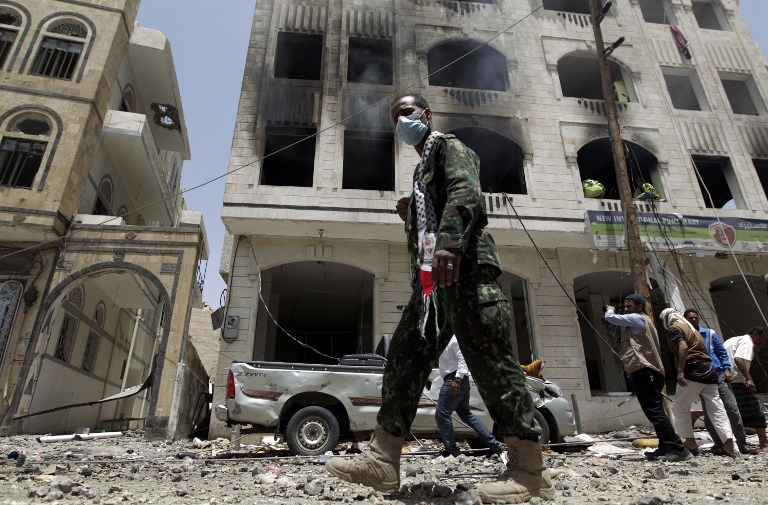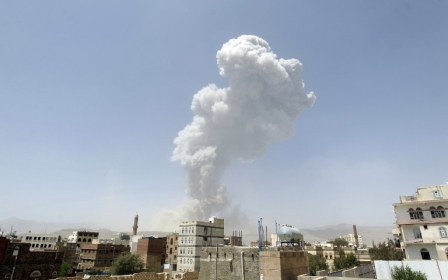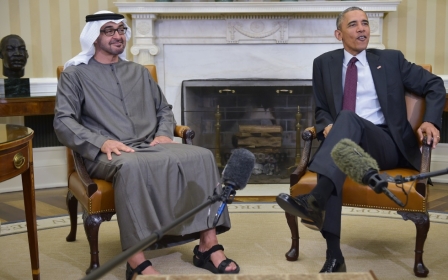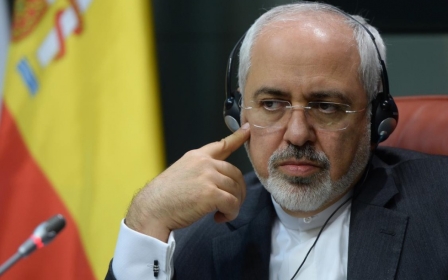US carrier to monitor Iranian vessels as Sanaa bombing toll climbs

US naval officials confirmed on Monday that they have sent an aircraft carrier to the Arabian Sea to monitor an Iranian convoy suspected of carrying weapons to Houthis in Yemen.
The USS Theodore Roosevelt was escorted by guided-missile cruiser USS Normandy "to ensure the vital shipping lanes in the region remain open and safe", bringing the number of American ships in the area to nine, said US navy officials.
The Iranian convoy, which the US suspects of carrying weapons to Houthis, is comprised of nine ships, including two patrol boats, a senior defence official told AFP.
Although Iran and the Houthis have established diplomatic ties in recent months and Iranian politicians have spoken out in favour of the Houthis, the extent and nature of Iran's support for the militia remains unclear.
In recent days, Iran has made a push to help mediate the nearly month-long fighting in Yemen. On Friday, Iran's Foreign MInister Mohammad Javad Zarif proposed a four-point plan calling for an immediate ceasefire and the formation of a unity government.
But Yemen's Foreign Minister Riyadh Yassin rejected Iran's mediation offer on Monday, saying the country had become a party to the conflict. Instead, he said, the Houthis should surrender.
Any chance of a swift diplomatic solution also faded as Saudi UN ambassador Abdallah al-Mouallimi told UN chief Ban Ki-moon on Monday that "certain conditions" must be met for the air campaign to be suspended and that these were spelled out in a recently adopted Security Council resolution.
The resolution, adopted last week, demands that the Houthis pull back from territory seized, including from Sanaa, imposed an arms embargo and called on them to end their violent campaign and return to peace talks.
Meanwhile on Tuesday the death toll was still climbing after Saudi-led coalition airstrikes hit a missile depot in the Houthi-held, hilltop Fajj Attan area of Sanaa which sparked explosions that killed at least 28 people and wounded nearly 300.
Fires broke out at the missile base and a nearby petrol station, witnesses said, and the scorching heat could be felt from far off.
With the Iran convoy in the Arabian Sea, US officials suggested that it would likely be Saudi Arabia, Egypt and their allies, not US personnel, that would intercept Iranian ships if needed.
One official said the Iranian convoy had passed through the Strait of Hormuz to leave the Gulf and was now headed west, thus potentially toward Yemen.
The coalition says it has carried out more than 2,000 strikes since the start of the campaign, gaining complete control of Yemeni airspace and knocking out Houthi infrastructure.
New MEE newsletter: Jerusalem Dispatch
Sign up to get the latest insights and analysis on Israel-Palestine, alongside Turkey Unpacked and other MEE newsletters
Middle East Eye delivers independent and unrivalled coverage and analysis of the Middle East, North Africa and beyond. To learn more about republishing this content and the associated fees, please fill out this form. More about MEE can be found here.





